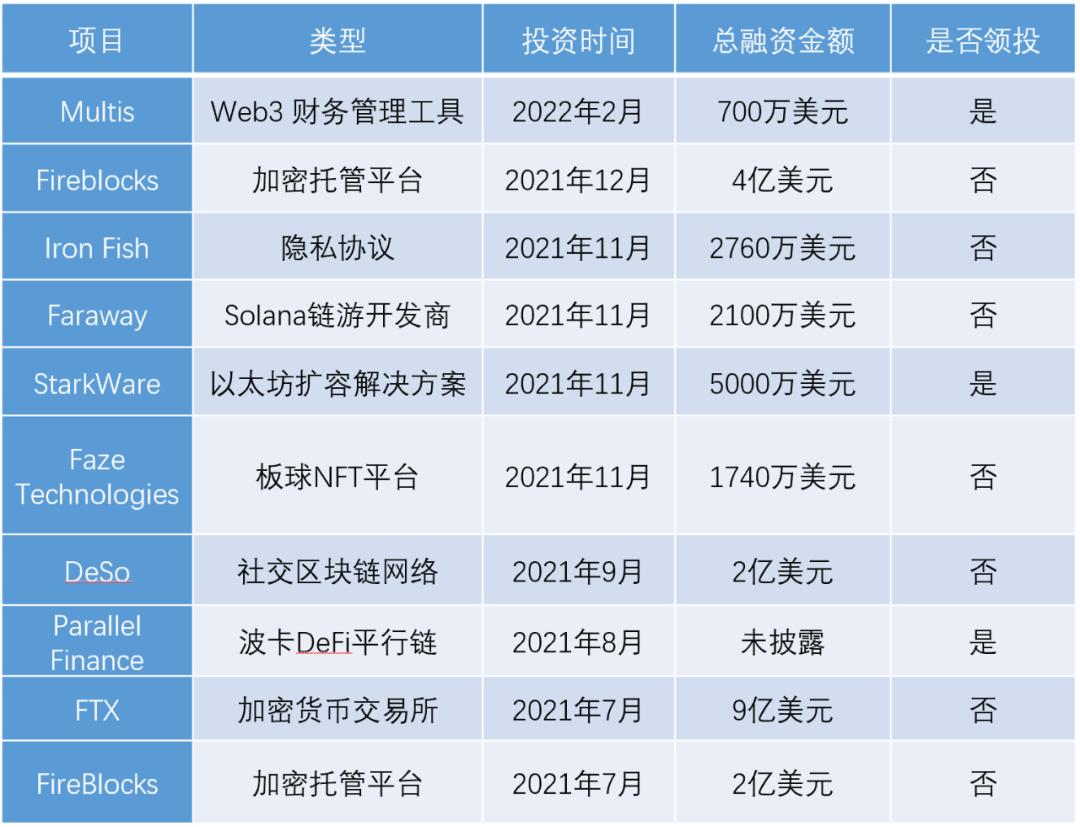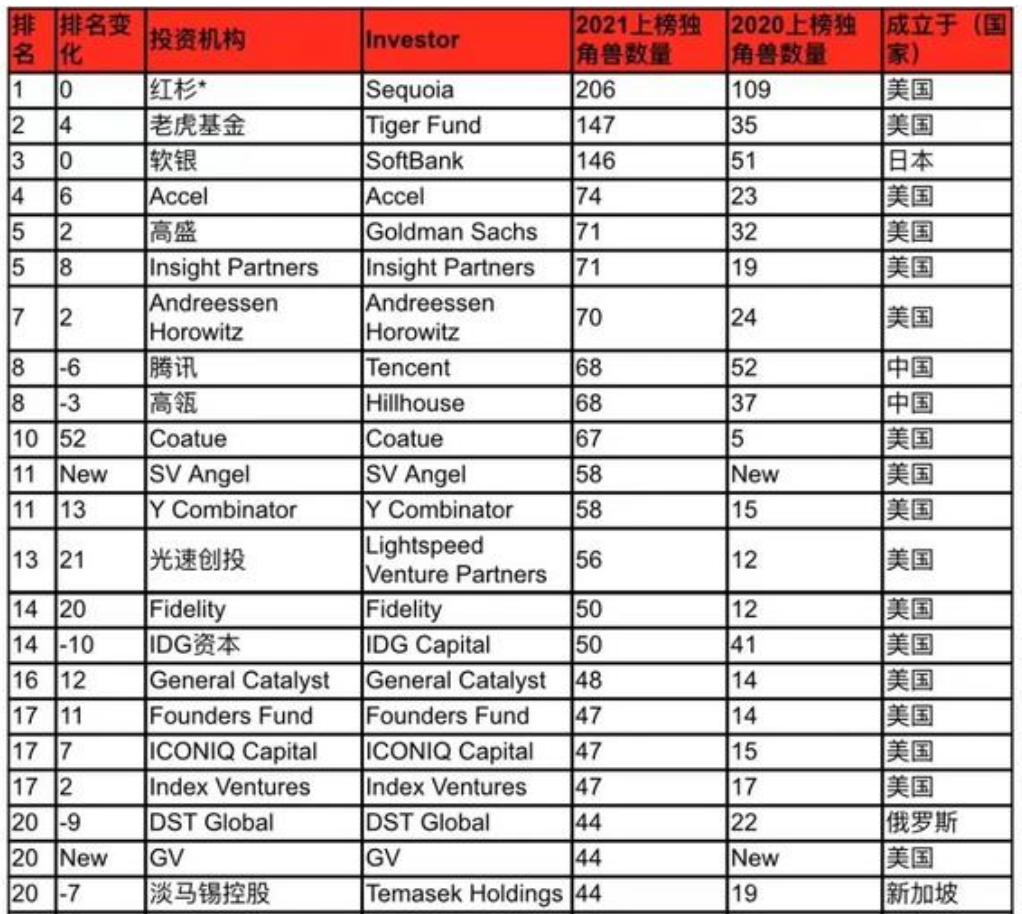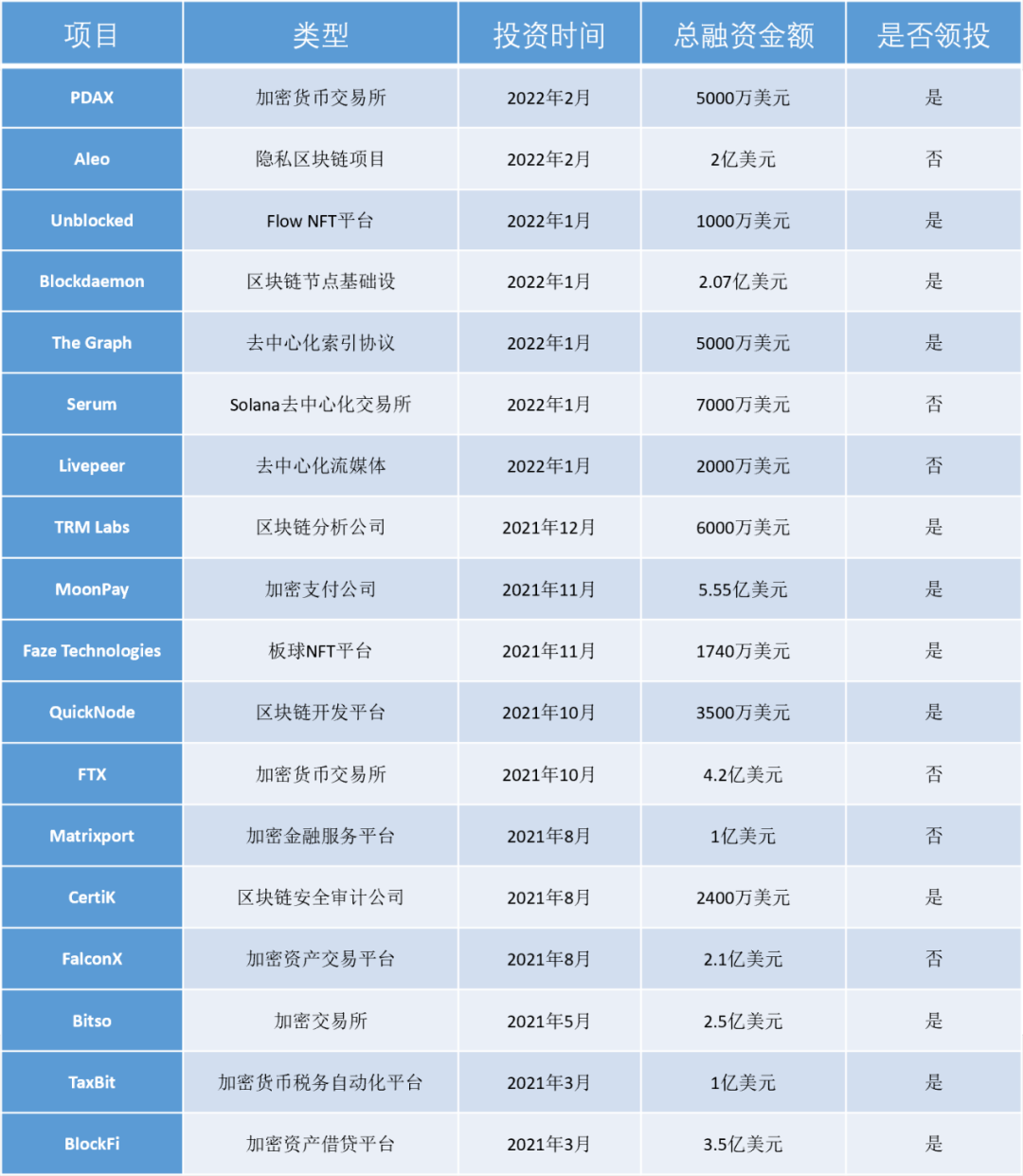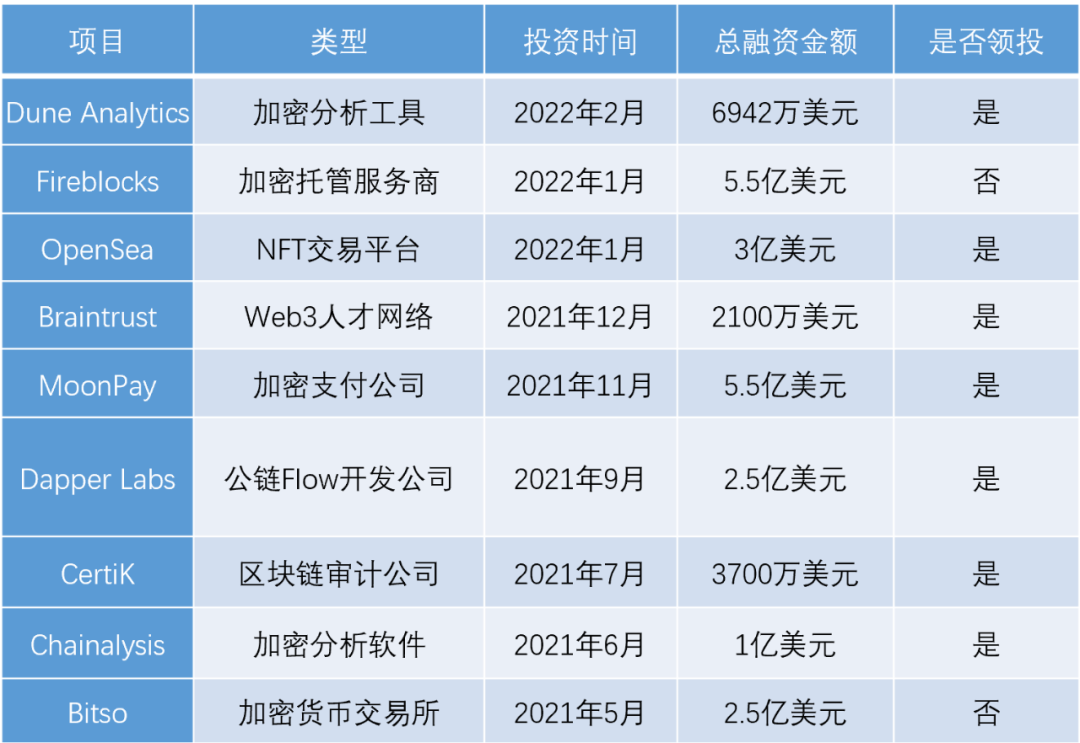Sequoia Capital Partner Maguire: Crypto will be the biggest trend in the next 30 years
Squecion Capital Partner Maguire said in an interview that encrypted currencies will become the greatest trend in the next 20-30. To this end, the sewing capital adjusts the fund structure and establishes an independent encryption fund to ensure that this time trend.
In addition, there are many traditional ventiators such as Tiger Global, Accel, Insight Partner, Goldman Sachs, Coatue, A16Z, USV, etc., and USV.
After investing in several crypto projects, renowned venture capital firm Sequoia Capital officially launched a separate crypto investment fund on February 17, mainly investing in liquid tokens and digital assets, which has caused a huge reaction in both the venture capital circle and the crypto industry.
Although the size is only $500-600 million, accounting for less than one-tenth of its total management size, this is Sequoia Capital’s first sector-specific fund since its establishment in 1972. Last October, Sequoia Capital said it was breaking away from the traditional organizational structure based on fund cycles to form Sequoia Capital Funds that support an open-ended liquid portfolio with a single permanent structure, including through registered investment advisors.
“This new structure removes all artificial time frames about how long we can work with a company. It allows us to participate on their boards and help them realize their potential over the course of decades,” Sequoia Capital said.
Sequoia Crypto Fund, on the other hand, is the first sub-fund of Sequoia Capital Fund and the first public progress of Sequoia’s aforementioned reform. Next, Sequoia Capital also plans to establish an expansion fund and an ecosystem fund. “We want to achieve a balance that can act quickly and flexibly with expert crypto knowledge, and also ensure that] the knowledge learned is being shared across Sequoia Capital.” said Michelle Bailhe, Partner at Sequoia Capital.
As one of the world’s oldest and most influential venture capital institutions, Sequoia Capital has always maintained a keen sense of market cutting-edge trends and agile response speed, which is reflected not only in the aforementioned system reform but also in its long-term exploration of the crypto field.
01To increase the bet on crypto track, Sequoia Capital is serious
How much does Sequoia Capital really value the crypto track? This can be seen in Sequoia Capital partner Maguire’s latest interview statement. In an interview with The Block, Maguire affirmed that cryptocurrency will become the biggest trend in the next 20-30 years.
This is the conclusion Sequoia Capital has reached after exploring the crypto track for almost 8 years. Sequoia Capital has been exploring the whole track since 2014, investing in several cryptocurrency projects through equity and token transactions. Among them, the crypto projects invested by Sequoia Capital China include Firecoin, Bitmain, Nervos Network, Conflux, Animoca Brands, etc., while the crypto projects invested by Sequoia Capital itself include Filecoin, FTX, Fireblocks, StarkWare, BitClout, Iron Fish On the same day, Sequoia Capital announced the establishment of its crypto fund.
On the same day that the crypto fund was announced, Sequoia Capital also announced that it led a $7 million funding round for Multis, a Web3 financial management tool that provides a software layer for web3 organizations to manage their crypto finances.

As far as the main body of Sequoia Capital is concerned, according to the incomplete statistics of Chain Catcher, the institution has made 12 investments in at least 10 projects since the beginning of last year, and the types of investments almost cover most of the mainstream tracks, including Layer1, Layer2, NFT, CeFi, DeFi, privacy and so on. It is disclosed that more than 20% of Sequoia Capital 2021’s investments across the organization went into the cryptocurrency sector in the US and Europe.
In addition, from early investment in head projects mainly, Sequoia Capital also began to invest in early projects with relatively low valuation after November last year, reflecting the further expansion of Sequoia Capital’s participation depth in the crypto industry.
It is worth mentioning that in December last year, Sequoia Capital also cast the original 2005 YouTube investment memo as NFT and auctioned it on OpenSea to commemorate YouTube’s position in the development history of the Internet and to celebrate the unpredictable advantages of basic technologies such as encryption.
In January, Sequoia Capital briefly changed its official Twitter profile from “We help gutsy people build legendary companies, from ideas to IPOs and more.” to “We help gutsy people build legendary DAOs, from ideas to token airdrops.
So, how does Sequoia Capital specifically view the crypto industry? We can get a glimpse of it from an article the agency wrote last December talking about and the aforementioned casting NFT event.
The rise of blockchain echoes the rise of the internet itself, where the direct, free flow of information between people sets the stage for the direct, free flow of value on the blockchain. This is as much a cultural and psychological shift as it is a technological one, and it will enable a new economic reality worldwide. In the world of NFT, anyone can create digital assets and anyone can invest, bringing unprecedented diversity to asset valuation and trading.
……
In the next phase of digital evolution, the role of the distribution gatekeeper will diminish. Creators will gain control of assets and move them from aggregators to network participants. But the impact of blockchain goes far beyond the way currencies and digital goods are valued and traded. Decentralized protocols and new entities like DAOs could reshape everything from how products are built to how people communicate and create communities.
We can’t predict the scope of the change or how it will reshape culture. At these early stages, we don’t know what factors will catalyze the code, or in which direction it will move. These catalysts may be technology, regulation, or culture. It’s unclear whether the shift will come from the world’s new monetary diversity or from blockchain-enabled decentralized applications - or both.
What seems clear, however, is that blockchain technology is beginning to constitute a new protocol for digital interactions at a fundamental level. Innovation is accelerating at the application level above layer 1 blockchains, and below layer 1: one of the most exciting developments we are seeing is the pursuit of a protocol that allows different blockchains to interoperate fluidly. One can compare this work to TCP/IP for encryption. What this could unlock, we can only imagine. Early internet enthusiasts knew it would change everything, but they couldn’t foresee stock trading on an iPhone. The same is true of today’s encryption technology.
In an article written by Sequoia Capital partner Michelle Bailhe in late 2021, “Ask Not Wen Moon - Ask Why Moon,” she also addresses her view of the crypto industry’s stage of development.
Blockchain will rewrite the way we own, sell, buy, trade, exchange, and reward. As software permeates our world, so will cryptocurrency (software currency) permeate currency and everything we do with it.
……
Phase 1: Isolation. Crypto acts as a silo, disconnected from the non-crypto world. Crypto builds its own core protocols (think TCP/IP for the Internet, and Layer 1 blockchains like Bitcoin, Ether, and Solana for crypto). The protocols are inextricably linked to their native tokens, and the various Tokens create a demand for exchanges and additional financial services that most established players lack the technical and regulatory will to meet, thus allowing cryptocurrency natives to fill the gap. Crypto-native analogs of each financial service emerged in roughly their historical order: currencies, foreign exchange, lending, derivatives, insurance, options, ETFs, etc.
Phase 2: Connectivity. Connecting the crypto and non-crypto worlds. The non-crypto world sees the value of crypto and builds/buy infrastructure to access it. Custody/wallet, crypto fiat open/close channels, data feeds, blockchain-specific infrastructure and development tools grew exponentially during this time. New use cases from NFT art communities to gaming to Web3 social networks are attracting new users. As the mass market began to participate in the crypto market, competitive pressures greatly simplified the user experience and lowered barriers to access. Over the next decade, the number of users and developers with access to encryption will increase 10-100 times. We believe we are in Phase 2, which is just beginning.
Phase 3: Maturity. The convergence of the encrypted and non-encrypted worlds, so they are no longer distinct. As with mobile devices, once encrypted access is common enough, apps will have the foundation they need to reach their full potential. They will cross the chasm from encryption to ordinary life. What needs to be clear is that there is already a lot of building in consumer finance, DeFi, NFT, Web3, etc., but only a few hundred million people and institutions have access to them. As access expands, the user engagement of apps will increase by an order of magnitude.
With the above philosophy in mind, it is very logical for Sequoia Capital to invest in the crypto industry in a big way. This time, Sequoia Capital established a separate crypto fund, which will not only continue to maintain its investment in the crypto industry, but also further support the development of the industry from multiple levels, such as pledge and governance.
“While we have invested in equity and tokens over the past five years, many project founders have asked us to take a more active role in managing the tokens, including pledging, providing liquidity, participating in governance and trading through their platforms,” Our network of builders in Ether, Solana, major DeFi protocols and other areas have also urged us to do so,” Sequoia Capital said in the announcement.
As for the next investment direction, Maguire said in the interview that Sequoia Capital is particularly interested in cross-chain interoperability and GameFi projects, and said that multi-chain is the future. Currently, Sequoia Capital is monitoring the activities of developers across networks, including Terra, Avalanche, NEAR, Polkadot and Cosmos.
Another Sequoia Capital partner, Michelle Bailhe, said in an interview with CoinDesk that the fund is investing in “full-stack” projects, including Layer1, Layer2, data layer, decentralized finance (DeFi), centralized apps, payments, gaming, Web 3, NFT, and consumer and enterprise infrastructure.
“The fund is expected to be fully deployed within a year if the crypto market enters a bear phase, and in a little over a year if it enters a bull phase,” Maguire said.
In addition, Maguire also revealed in an interview with the Financial Times that Sequoia Capital will take a “20-year” approach to its cryptocurrency holdings and will avoid trading tokens unless there are “special circumstances”.
02 Venture Capital Institutions Pile In
In fact, except for Sequoia Capital, most of the world’s well-known venture capital institutions have almost all entered the crypto industry. Taking the 2021 Global Top 100 Unicorn Investment Institutions list released by Hurun as a comparison, except for a very few institutions such as Ali and Tencent, all of them have made investments in crypto projects.

Tiger Global
Founded in 2001, Tiger Global includes both private equity and public equity funds and is one of the world’s most recognized venture capital firms, ranked #2 on the 2021 Top 100 Global Unicorn Investors list.
Since March 2021, Tiger Global has begun investing significantly in crypto projects, including cryptocurrency tax automation platform TaxBit, Mexican crypto exchange Bitso, blockchain security auditing company CertiK, crypto payments company MoonPay, blockchain analytics company TRM Labs, decentralized streaming media Livepeer, decentralized Tiger Global is also one of the traditional venture capital firms that have invested the most in crypto projects.

SoftBank Vision
SoftBank is one of the world’s most well-known venture capital firms, known for Ali’s hundreds of thousands of times returns, and other notable investments including Uber, Wework, Drip, ARM and others, with a current portfolio of over $100 billion.
Since June 2021, SoftBank Vision Fund has begun to accelerate its investments in the crypto sector, including privacy blockchain project Aleo, cryptocurrency exchange FTX, blockchain analytics company Elliptic, soccer NFT collectibles platform Sorare, grayscale parent company DCG, NFT sandbox game The Sandbox, ethereum scaling solution provider Polygon and at least 10 other crypto projects, many of which are direct investments in project tokens.
Accel
Accel is an early and growth stage venture capital firm founded in 1983, with investments in notable projects including Dropbox, Facebook, Slack, Spotify, Supercell and others.
Since July 2021, Accel has invested in at least six crypto projects including Tenderly, an ethereum developer platform, Nansen, an on-chain data tool, CoinTracker, a crypto taxation platform, Sky Mavis, an Axie Infinity developer, and Sorare, a digital soccer NFT collection platform.
Goldman Sachs
Founded in 1869, Goldman Sachs Group is one of the oldest and largest investment banks in the world.
Since 2021, Goldman Sachs has invested in at least four crypto projects including Blockdaemon, a blockchain infrastructure provider; Anchorage, a crypto custodian; One River Digital, a crypto fund manager; and Coin Metrics, a crypto data company.
Insight partner
Founded in 1995, Insight partner is a leading global private equity firm focused on investing in mid- to late-stage VC and growth companies, with a particular focus on software development companies. It currently has a portfolio of over $30 billion, has invested in over 400 companies, and has completed over 200 M&A transactions for portfolio companies.
Insight partner’s public crypto investments include NFT studio Candy Digital, cryptocurrency wallet provider ZenGo, crypto tax software company TaxBit, cryptocurrency exchange FTX, and at least four other projects.
a16z
Despite being founded in 2009, a16z has quickly invested in well-known companies such as Facebook, Twitter, Groupon, and Skype, with over $10 billion in capital under management, jumping to the top of the world’s top venture capital firms.
At the same time, a16z is also one of the earliest and most deeply invested venture capital institutions in the crypto industry. a16z has been invested behind most mainstream crypto projects such as Coinbase, Compound, Dapper Labs, Arweave, Solana and Opensea, and has become the most influential venture capital institution in the crypto industry.
In June 2021, the institution announced the launch of a new $2.1 billion crypto fund, and recently rumored plans to raise up to $4.5 billion for a new cryptocurrency fund.
Coatue
Coatue is a global investment management firm founded in 1999 that focuses on public and private companies in the technology, media and telecommunications industries with $48 billion in capital under management.
Coatue has invested in at least nine projects since February 2021, including Flow public chain developer Dapper Labs, Mexican crypto exchange Bitso, blockchain analytics company Chainalysis, Web3 work platform Braintrust, NFT trading platform Oopensea, blockchain auditing company CertiK, and crypto analytics tool Dune Analytics, and has participated mostly as a lead investor.





